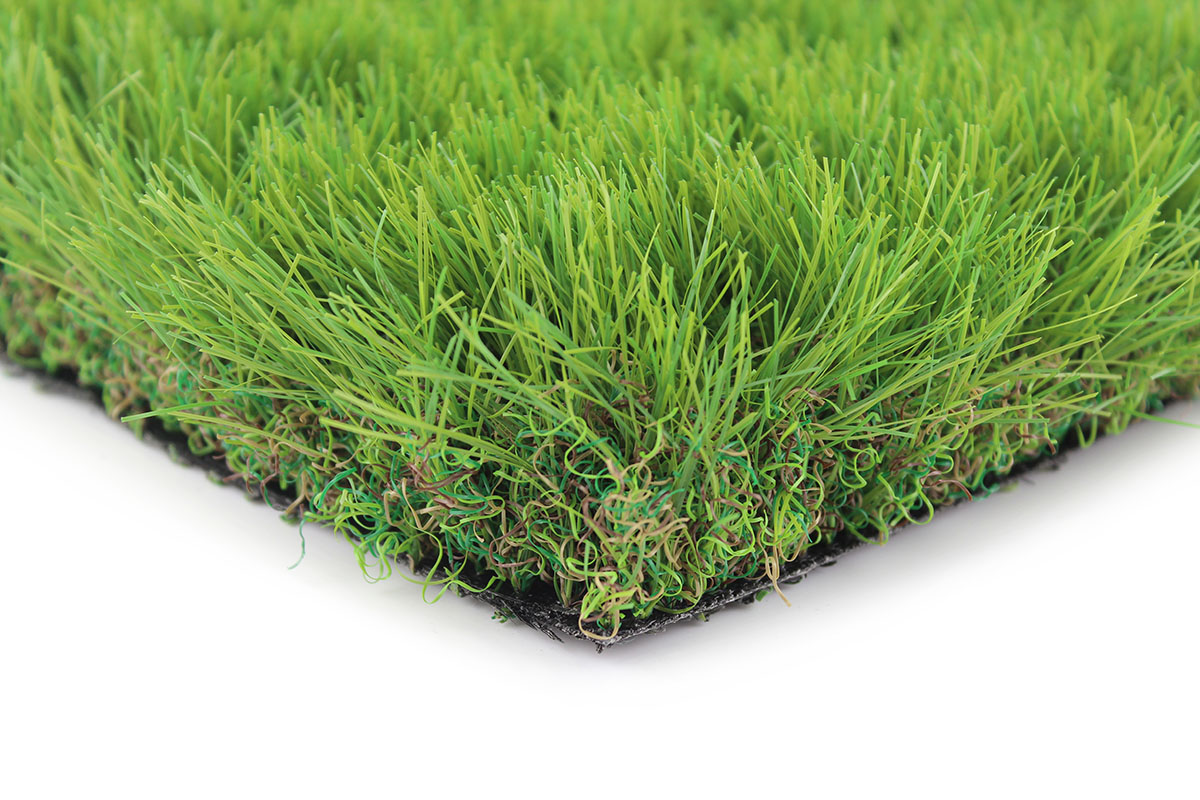
Artificial grass has become an increasingly popular choice for homeowners and businesses alike due to its low maintenance, durability, and versatility. With so many different types and brands of artificial grass available, it can be challenging to determine which one is best suited for your needs. In this article, we will explore the benefits of artificial grass, factors to consider when choosing artificial grass, the best brands options, types of artificial grass, comparison of different types, tips for choosing and maintaining artificial grass, and overall conclusion.
Contents
Why Do People Prefer Artificial Grass?
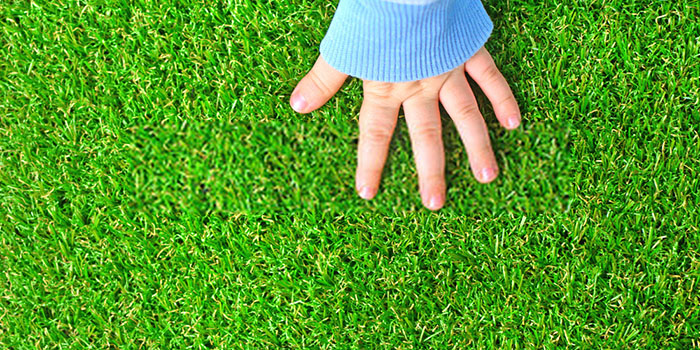
Artificial grass offers numerous benefits, including:
Low Maintenance
One of the biggest advantages of artificial grass is that it requires very little maintenance compared to natural grass. There is no need for watering, mowing, or fertilizing, which means less work and less cost in the long run.
Durability
Artificial grass is made to last for many years, even in harsh weather conditions. It can withstand heavy foot traffic, extreme temperatures, and even pets without showing signs of wear and tear.
Suitable for Different Purposes
Artificial grass can be used for a variety of purposes, including landscaping, sports, or pets. It is available in different types and materials to suit different needs.
Cost-Effective in the Long Run
While artificial grass may have a higher upfront cost compared to natural grass, it can be more cost-effective in the long run due to its low maintenance and long lifespan.
Factors to Consider When Choosing Artificial Grass
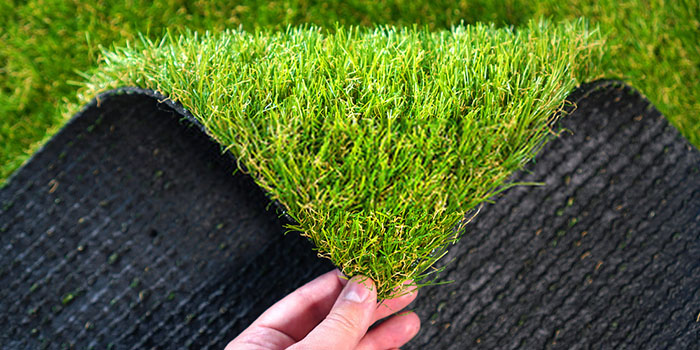
When choosing artificial grass, there are several factors to consider to ensure that you choose the right type for your needs. Some of the most important factors include:
Purpose and Location
The purpose and location of the grass will determine the type of artificial grass you need. For example, if you are using it for landscaping, you may want natural-looking grass that blends well with your surroundings. On the other hand, if you are using it for sports, you need more durable grass that can handle heavy foot traffic and different types of sports activities.
Material and Quality
The quality and material of artificial grass can vary widely, affecting its durability, appearance, and performance. The most common materials used for artificial grass are polyethylene, polypropylene, and nylon. Polyethylene is the most popular material due to its natural look and feel.
Pile Height and Density
The pile height and density of the grass can affect its appearance, softness, and durability. The pile height refers to the length of the blades, while the density refers to the number of blades per square meter. A higher pile height and density can make the grass look more natural and feel softer underfoot.
Backing Material
The backing material of the grass is the layer that supports the blades and holds them in place. It can be made of different materials, such as latex, polyurethane, or polyester. The backing material affects the stability, durability, and drainage of the grass.
Drainage
Proper drainage is essential for maintaining the health and appearance of artificial grass. The grass should have a perforated backing and a base layer that allows water to drain through easily.
Maintenance Requirements
While artificial grass requires less maintenance than natural grass, it still needs some care to keep it looking its best. Some types of artificial grass may require more maintenance than others, such as those that need infill or those with longer blades.
UV Resistance
Artificial grass that is exposed to direct sunlight can fade over time, losing its natural look and feel. UV-resistant artificial grass can withstand the effects of sunlight, retaining its color and texture for longer.
Cost and Warranty
Artificial grass can vary widely in price, depending on factors like quality, pile height, and density. It’s important to choose a type of artificial grass that fits your budget, while still providing the quality and durability you need. Additionally, make sure to choose a supplier that offers a good warranty, so you can have peace of mind knowing that your investment is protected.
Best Artificial Grass Brands Options
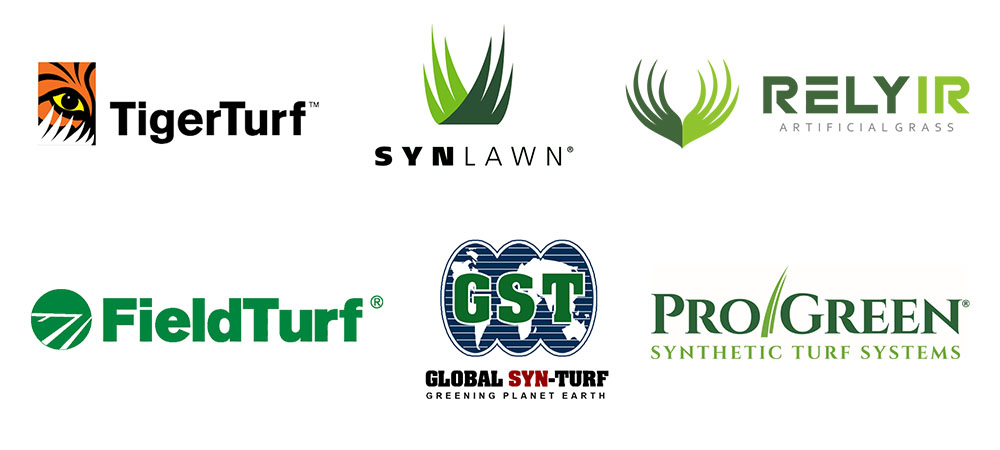
When it comes to choosing the best artificial grass for your needs, it’s important to consider the quality of the product and the reputation of the brand. Here are some of the best artificial grass brands on the market:
Relyir Artificial Grass
Relyir is a top manufacturer of residential, sports, and landscaping artificial grass in China since 2006. They offer a wide range of options at competitive prices, including color, length, and density, to meet every requirement. Their customer-focused approach prioritizes satisfaction, and they provide budget-friendly, high-quality installations. From commercial properties to government facilities and individual homeowners, Relyir is the go-to choice for all your artificial grass needs.
Global Syn-Turf
Global Syn-Turf is the top manufacturer and distributor of artificial grass in the US. With warehouse locations in major cities including Northern and Southern California, Florida, Texas, Arizona, and Nevada, they quickly and efficiently fulfill all client needs. They offer same-day shipping and a vast collection of synthetic turf for any application, from landscape lawns to sports fields, pet areas, and rooftops. Whether you’re a homeowner, retailer, or installer, Global Syn-Turf has a product to fit your vision and budget.
FieldTurf
FieldTurf is the leading inventor and manufacturer of infilled artificial turf globally. With over 6,500 installations in North America and 25,000 worldwide, more than half of the NFL teams and hundreds of NCAA D-1 programs have selected FieldTurf for their game and/or practice facilities. The company is a partner of FIFA, World Rugby, FIH, ITF, and FFF, and is part of Tarkett Sports, offering a comprehensive portfolio of sports flooring solutions. The Tarkett Group is a worldwide leader in innovative flooring and sports surface solutions.
ForeverLawn
ForeverLawn, founded in 2004 by two brothers, is a leader in the synthetic turf industry. Through customized solutions tailored to customer needs, ForeverLawn revitalizes spaces. The company exclusively operates through a local dealer network, providing excellent service and products to markets and communities. ForeverLawn has installed over 50 million square feet of synthetic grass worldwide for clients like Walt Disney World, Google, Starbucks, and ESPN.
ProGreen Synthetic Grass
ProGreen Synthetic Grass has two ISO 9001-certified manufacturing facilities in Alabama and Georgia, USA, where they extrude yarns and produce turf products. They have provided synthetic lawns and over 1,500 fields worldwide. ProGreen handles everything from raw materials to installation, making them the only company in the USA to do so. They boast the largest global dealer network in the industry, offering artificial grass for lawns, dogs, putting greens, tee lines, playgrounds, pool surrounds, and more.
TigerTurf
TigerTurf utilizes Tencate’s advanced yarn extrusion technology and distributes its products worldwide. With a focus on performance, TigerTurf provides reliable and low-maintenance surfaces for sports fields, schools, playgrounds, residential lawns, commercial landscaping, and more. With decades of experience, TigerTurf offers high-quality and durable solutions for various applications, along with expert knowledge and customer service. TigerTurf is committed to providing exceptional products and service throughout the entire purchasing process.
SYNLawn
SYNLawn is the leading and most innovative manufacturer of artificial grass in North America, with global locations. As part of the Sport Group Holding family, SYNLawn offers top-quality products, along with sister brands Astroturf, Rekortan, and Laykold. SYNLawn’s distributors promote environmental responsibility through innovative practices. With private facilities in Georgia, USA, SYNLawn uses sustainable, bio-based ingredients and additives to meet customers’ diverse needs. SYNLawn sets industry standards and transforms the concept of artificial grass.
Types of Artificial Grass
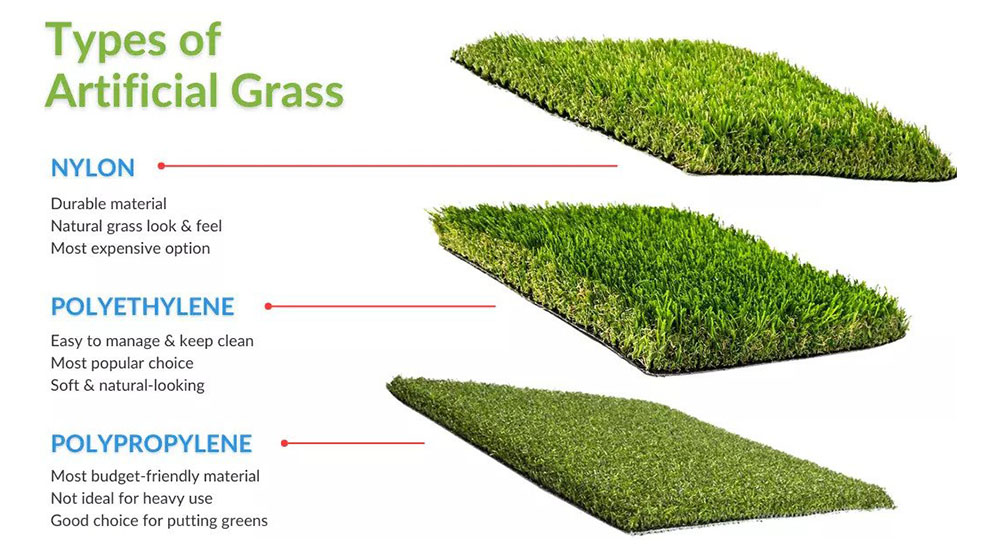
There are different types of artificial grass available on the market. Each type has its own unique features, advantages, and disadvantages. Here are the four main types of artificial grass:
Nylon Grass
Nylon grass is the strongest and most resilient type of artificial grass. It has a high wear-and-tear rating and is often used in high-traffic areas such as sports fields and playgrounds.
Advantages:
- High durability
- Retains its original shape well
- Resistant to UV rays and fading
Disadvantages:
- Prone to heat damage
- Can feel rough to the touch
Recommended Uses:
- Sports fields
- Playgrounds
- Areas with heavy foot traffic
Polypropylene Grass
Polypropylene grass is the most affordable type of artificial grass. It has a lower durability rating than other types, but it is still a popular option for low-traffic areas.
Advantages:
- Low cost
- Lightweight and easy to install
- Resistant to moisture and mildew
Disadvantages:
- Less durable than other types
- Can melt under high heat
- Less realistic appearance
Recommended Uses:
- Low-traffic areas
- Balconies and rooftop gardens
- Temporary landscaping projects
Polyethylene Grass
Polyethylene grass is the most realistic-looking type of artificial grass. It has a soft texture and is often used in residential landscaping projects.
Advantages:
- Realistic appearance
- Soft to the touch
- Resistant to UV rays and fading
Disadvantages:
- Lower durability than nylon grass
- Prone to flattening under heavy foot traffic
Recommended Uses:
- Residential Landscaping
- Golf courses
- Rooftop gardens and balconies
Tips for Choosing Artificial Grass
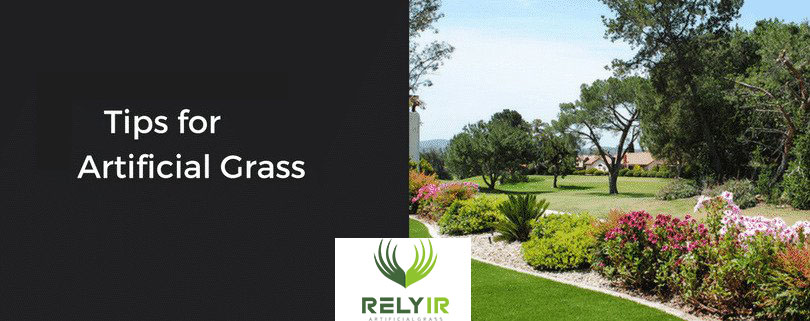
Consideration of Climate
The climate in your area can affect the performance and lifespan of your artificial grass. If you live in a hot and dry climate, you may want to choose artificial grass that is resistant to heat damage. If you live in a wet climate, you may want to choose artificial grass that is resistant to moisture and mildew.
Consideration of Intended Use
Think about how you plan to use your artificial grass. Will it be used for a high-traffic area like a sports field, or for a low-traffic area like a residential backyard? The intended use can help you determine the type of grass that will be most suitable.
Comparison of Different Types of Artificial Grass
Compare the different types of artificial grass available based on factors like durability, appearance, maintenance, and price. Consider the advantages and disadvantages of each type to determine which one meets your specific needs.
Personal Preference
Ultimately, personal preference will play a role in choosing the right artificial grass. Consider factors like texture, color, and overall aesthetic to choose a grass that you will be happy with in the long run.
Choose a reputable supplier
It is important to choose a reputable supplier that offers high-quality products and a good warranty.
Overall
When it comes to choosing the best artificial grass, there are several factors to consider, including durability, appearance, maintenance, price, and environmental impact. By understanding the different types of artificial grass and how they compare to one another, you can make an informed decision that meets your specific needs.
FAQS
What type of artificial grass is best for a high-traffic areas?
When choosing artificial grass for a high-traffic area, you'll want to prioritize durability and resilience. Consider nylon or blended grasses, which are known for their strength and ability to withstand heavy use.
Is artificial grass environmentally friendly?
Artificial grass can be an eco-friendly option compared to natural grass, as it requires less water and maintenance. Look for grasses made from recycled materials or those that are recyclable themselves for a more environmentally friendly option.
Is there a significant price difference between different types of artificial grass?
The cost of artificial grass can vary depending on factors like type, quality, and installation requirements. Generally, nylon and blended grasses tend to be more expensive, while polypropylene and polyethylene grasses are more affordable.
Can I install artificial grass myself, or do I need to hire a professional?
While it is possible to install artificial grass yourself, it can be a challenging and time-consuming process. Hiring a professional can ensure that the grass is properly installed and will perform as expected.
How does the appearance of artificial grass compare to natural grass?
Artificial grass has come a long way in terms of appearance and can now closely mimic the look of natural grass. High-quality options are often difficult to distinguish from the real thing.
How long does artificial grass typically last?
The lifespan of artificial grass can vary depending on factors like type, quality, and maintenance. High-quality options can last up to 8 - 25 years or more with proper care.
Are there any health concerns associated with artificial grass?
There are some concerns about the potential health effects of artificial grass, particularly when it comes to the use of certain infills. It's important to choose an infill that is safe and non-toxic, such as those made from recycled materials or organic materials.
How much maintenance is required for artificial grass?
Artificial grass requires much less maintenance than natural grass, but some upkeep is still necessary to ensure its longevity. This can include regular brushing, cleaning, and occasional infill replacement.
